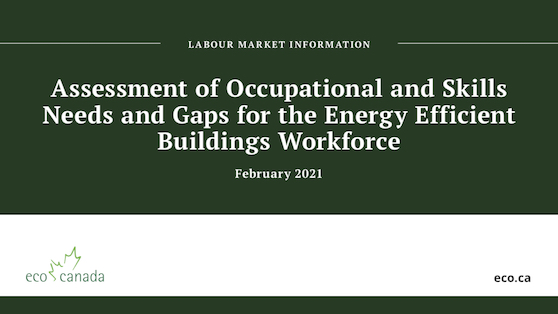
Commercial
Energy Efficiency
Features
Industrial
Institutional
Net Zero
News
“Building-as-a-system” mindset crucial for energy-efficient buildings workforce, ECO finds
March 6, 2021 By Anthony Capkun
 “Assessment of occupational and skills needs and gaps for the energy-efficient buildings workforce”, ECO Canada, February 2021.
“Assessment of occupational and skills needs and gaps for the energy-efficient buildings workforce”, ECO Canada, February 2021. March 6, 2021 – ECO Canada released a report on the opportunities and consequent gaps in the building sector as Canada works toward net zero emissions by 2050, and a “building-as-a-system” mindset is a fundamental requirement.
“For Canada’s buildings to become more energy-efficient, there has to be a workforce that is able to meet the demands of that effort,” said Kevin Nilsen, president & CEO, ECO Canada.
The report, “Assessment of occupational and skills needs and gaps for the energy-efficient buildings workforce”, outlines the capacity of the current workforce and the gaps that need to be filled as Canada’s buildings transition to becoming more energy efficient.
Energy efficiency is optimized through integrated processes throughout a building’s life cycle, the report finds, which also demands a collaborative approach among multiple disciplines: from design and engineering professionals, to energy managers, construction and trade workers, and building operators.
IT specialists will also play a key role in the transition, as digital technology becomes more essential in the optimization of building performance.
Traditionally, these disciplines worked on a sequential approach from design to construction, commissioning, management, and retrofitting, notes the report, but working to optimize a building’s performance over time requires a workforce culture shift because businesses and individuals need to work together throughout the building life cycle.
The report delves into both Core Occupations and Growing Occupations, which are defined as:
CORE: “Occupations and/or skills currently available within the building sector workforce and that remain especially important for the growth of energy-efficient, high-performing buildings.”
GROWING: “Occupations and/or skills currently available but that are expected to grow at a faster rate than others due to their involvement with specific, energy-efficient-related technologies, materials and/or processes.”
Check out Appendix 2, “Occupations required to support energy-efficient buildings, by building life cycle phase”.
Building knowledge, technical competencies, and soft skills across all roles are key to this collaborative approach, the report highlights. These issues are also compounded by labour shortages due to challenges in attracting new talent to the building sector coupled with an aging workforce, which is taking its knowledge and experience with it into retirement.
The report makes recommendations for industry, government, and post-secondary institutions to develop solutions for addressing the workforce issues facing the building sector if it is to meet Canada’s Build Smart and Net Zero goals.
Among them, working together to improve the sector’s attractiveness, develop a hiring forecast, and align education and training to address skills gaps.
The study was made possible with funding from Natural Resources Canada’s Office of Energy Efficiency, Buildings & Industry Division, and the Government of Canada’s Sectoral Initiatives Program.
To download the full report, visit ECO Canada.
Print this page